
David Icke has a theory about why Iran was badly hit by coronavirus in March. Sort of.
“We have a country targeted by America, targeted by Israel – Iran,” says the professional conspiracy theorist in an interview with ‘alternative’ media outlet London Real.
“And as this virus came out of China, of all the countries in all the world, Iran got it smack – worse than anyone before it started to appear in Italy.”
“It was a little odd,” interjects Brian Rose, the boss of London Real. “It could have been a coincidence.”
“After 30 years, Brian, coincidences are something I have to be very well persuaded [of],” says Icke. “Cos coincidences don’t turn out to be so. They turn out to be made to happen.”
Not many years ago, conversations like these might have been confined to a pub, a family get-together, or perhaps an organised gathering of conspiracy theorists.
In 2020, they play out in front of millions of people on technology platforms owned by the world’s largest companies.
This exchange between Rose and Icke (who is portrayed as an expert) is available for anyone to watch online right now.
It is live on London Real’s “verified” Youtube channel, it’s been viewed more than 600,000 times and, until last week, it had advertising for household brand names running alongside it.
Youtube and other tech platforms like Facebook have been applauded in recent weeks for taking steps to challenge Covid-19 misinformation by cracking down on accounts that peddle unproven – and potentially harmful – conspiracy theories about the pandemic.
Amid increasing political pressure, the tech giants have suspended accounts, deleted hundreds of posts and videos, and attempted to help users find reputable information.
But an investigation by Press Gazette today exposes how these same companies’ platforms have facilitated the growth of conspiracy theorists and the ‘news’ outlets that promote them.
The result is that huge amounts of money has been split between the conspiracy theorists, the ‘alternative’ media and the tech giants themselves.
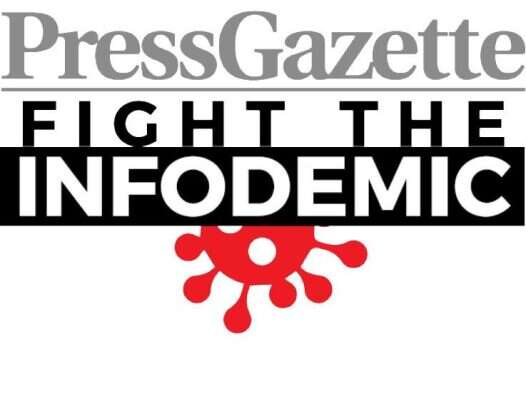
As part of Press Gazette’s Fight the Infodemic campaign we today publish an investigation which focuses on Icke and London Real and reveals:
- Youtube was still running adverts for Icke’s documentaries weeks after it chose to delete his account to protect users from potentially harmful Covid-19 misinformation
- Facebook has run adverts for both Icke and London Real, which says it has paid the platform nearly £2m in fees over the last three years
- Icke and London Real both enjoyed major spikes in their web traffic in April, with social media platforms driving millions to clicks to the sites this year
- Research showing that Icke and London Real’s social media followers could be worth more than $40m a year to Facebook and Youtube.
Commenting on the findings of Press Gazette’s investigation, Imran Ahmed – chief executive of the Center for Countering Digital Hate, which has been campaigning for Icke to be removed from various online platforms – accused social media companies of allowing the conspiracy theorist to “build a huge audience, which is particularly dangerous during the current pandemic when his misinformation could lead people to put themselves and others at risk.
“It is not acceptable that he is allowed to continue on Instagram and Twitter, while surrogate accounts continue to post Icke’s dangerous videos to Facebook and YouTube. The fact that conspiracists continue to profit from these platforms makes a mockery of tech companies’ claims to be playing their part in the recovery from this pandemic.”
Jason Kint, chief executive of US digital publishing trade body Digital Content Next – which has been lobbying for the tech giants to tackle fake news for several years – said: “The major tech platforms nearly act as investors in the success of this content and certainly they benefit.
“It’s their recommendations more than anything that act as the market maker putting the programming on the map for the users. Prior research has shown up to 80 per cent of YouTube’s traffic is a result of its recommendations.
“The platforms and public debate too often get wrapped up in binary decisions of whether content should be taken down or left up, often generalised as censorship. This misses significant nuance that determines whether the video dies on the vine or gets the free velocity and reach of the algorithms that can make them into instant success.
“To the platforms, the latter case is engagement and revenue.”
David Icke: The conspiracy theorist
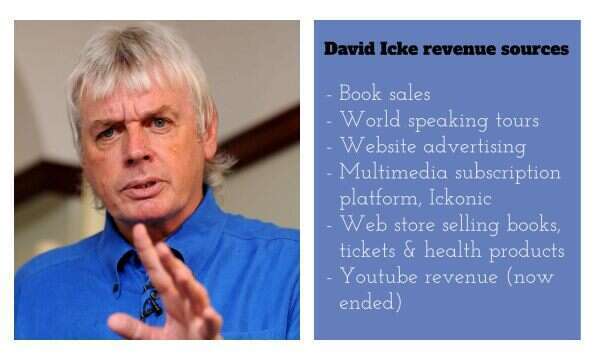
Made on BeFunky. Photo credit: Anna Gowthorpe/PA Wire
In 1991, David Icke – a former professional footballer and BBC presenter – became a national laughing stock when he was ridiculed in a TV interview with Sir Terry Wogan for claiming to be the son of God and for stating that Saddam Hussein was dead (video below).
But in the following years, while promoting himself as a journalist and pushing various outlandish theories including claims that the world is run by a reptilian order, Isle of Wight-based Icke gained a large international following.
Research into Icke’s money-making ventures suggests his products – including his books and arena speaking tours – have racked up millions of pounds in sales over the years.
Icke said our figures were “so outrageously and shockingly over-the-top [they] had us laughing till our bellies hurt. Why then do I live in a one-bedroom flat where I have lived for 20 years? I want an answer to that question, by the way. I can’t wait.”
Icke declined to provide a more accurate picture of his finances.
How much does David Icke earn?
In an in-depth 2012 documentary filmed with Icke – in which he claims the Isle of Wight is run by “a network of Freemasons, Satanists and paedophiles” – Vice reported that he had at that stage sold 20m copies of his books.
A more conservative estimate, published by the Telegraph and based on research by publishing industry analyst Nielsen, suggested that, by 2011, at least 140,000 copies of Icke’s books had been sold for more than £2m.
Papers from a court case in the US in 2007 confirm that in the early 2000s, Icke’s books were making sales in the millions of dollars.
Alongside book sales, Icke has been running public speaking tours across the world over many years. Around the time of a 2011 tour, in which he is said to have spoken in ten cities across three continents, the Telegraph reported that sales for a single show totalled £83,000.
Icke is currently selling tickets for six shows this autumn – in Budapest, Copenhagen, Gothenburg, Oslo, Malaga and Manchester – with tickets advertised for £35-65.
He also uses his website, davidicke.com, to make money. Banner advertising on his main page and his forum page costs £600 a month or £1,000 for two months, according to a sales document. He also sells advertising on his videos, including those which formerly appeared on Youtube, in packages ranging between £100 and £1,000.
In addition, Icke sells access to a multimedia platform on his website, called Ickonic, for £99 a year. And he has an online shop, which sells tickets to his shows, books for up to £26, and health products like “body biotics” for children.
In recent years, Icke will also have earned revenues from his Youtube account, which had around 900,000 subscribers before it was closed down, according to data from analysis site Social Bakers.
The Center for Countering Digital Hate has been campaigning for social media companies to remove Icke from their platforms. Before his account was deleted, the CCDH estimated that Icke could have been raking in annual revenues of up to $192,000 from his Youtube content.
Icke also had 800,000 ‘likes’ on Facebook before the tech giant removed his official account this year. This exposure will have been used by the conspiracy theorist to promote his books, shows and his website.
Despite Youtube and Facebook choosing to remove Icke from their platforms this month, the conspiracy theorist remains live on Twitter, where his account is “verified” – with a blue tick that suggests to many he is trustworthy – and has 300,000 followers.
He uses his account to promote conspiracy theories on his website – like the claim that protective masks are harmful – and to promote his brand and his products.
David Icke’s UK tour of evening events is about to start with all tickets nearly gone. See what ‘they’ don’t want you to know and why they try to silence him https://t.co/Mu8fdJlEOO pic.twitter.com/VRUZIkwcsJ
— David Icke (@davidicke) April 4, 2018
Interest in Icke has taken off since the coronavirus crisis began. SimilarWeb figures obtained by Press Gazette show that davidicke.com was visited 4.3m times in April – up from 1.3m in March, 600,000 in February and 700,000 in January.
This means that in April, davidicke.com became bigger than many legitimate and significant news websites. For example, the website of the Isle of Wight County Press – Icke’s local newspaper – received just less than 1m clicks, according to SimilarWeb figures.
Between January and April of this year, 31 per cent of Icke’s traffic – more than 2m clicks overall – came from social media websites, according to SimilarWeb. Of these clicks, 43 per cent came from Facebook, 38 per cent from Twitter and 18 per cent from Youtube.
When asked to comment on this story and his income, Icke said: “William – you are just another mindless prat believing whatever you are told and calling it ‘journalism’…
“I love your ‘sources’ like VICE?? (take yourself seriously, man) and the Center for Countering Digital Hate (CCDH)?? What do you know about Vice and the CCDH? Who runs them? What is their background? Who funds them? What is their background? The answer of course is you know NOTHING because you are to journalism what an elephant would be to hang-gliding. If you were a proper journalist you would not be employed by the mainstream media.
“Your brain power would never manage the thought process to ask why the entirety of the system is targeting me from every angle despite utterly controlling the narrative through repeater-prats like you. Why would they bother with people like me if what we said had no validity? Controlling 99% of the narrative is not enough – it must be 100% – and pawns like you in a game you will never begin to understand play their part to perfection. You are about to so again.”
Forming an accurate picture of Icke’s finances is challenging. He is associated with several firms on Companies House in the UK, none of which have been required to file full accounts.
One of the companies, Phantom Self – which holds stakes in several of the other firms and counts Icke as its majority shareholder – reported having cash “at bank and in hand” of £159,869 as of 31 Mach 2019.
London Real: The alternative media outlet
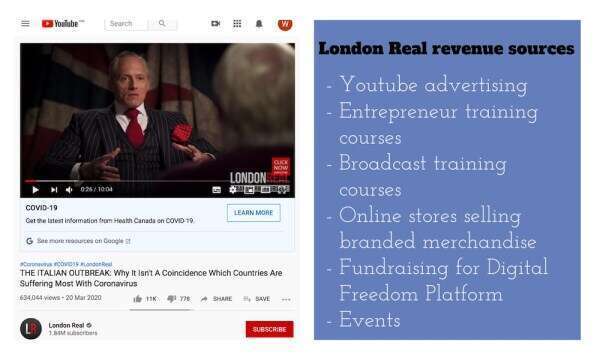
Made on BeFunky
Like Icke, Brian Rose calls himself a journalist. A former City of London broker, according to his Linkedin page, Rose set up London Real in 2011, initially as a podcast, “as an antidote to the numbing effects of mainstream media”.
In recent years, he has built the brand up into a “verified” Youtube channel with 1.85m subscribers – more than established brands like ITV News, the Daily Mail, the Washington Post, the Telegraph and the Wall Street Journal.
London Real produces an eclectic range content – from interviews with politicians like former London mayor Ken Livingstone to videos of Rose apparently drinking his own urine – but one of its specialities is conspiracy theory.
In recent months, interviews with Covid-19 conspiracy theorists – Icke, in particular – appear to have propelled London Real’s popularity to a new level.
One 45-minute clip from Rose’s first Covid-19 interview with Icke had been viewed more than 6m times, making it the channel’s most popular Youtube video at the time, before it was removed following a Press Gazette report.
When contacted by Press Gazette for this article, Rose played down the significance of Icke, Covid-19 and conspiracy theories to London Real. He estimated that less than five per cent of London Real’s content is “represented by anything related to either Covid-19 or what you deem ‘conspiracy theories’”.
Breaking down London Real’s earnings
Applying the methodology used to estimate Icke’s earnings from Youtube, the Center for Countering Digital Hate suggested that London Real could be making up $261,349 annually from advertising on its Youtube content.
When Press Gazette asked Rose to comment on this figure and this article, he said: “These statements are, in our view, deliberately distorting ‘typical rates’ in an attempt to make it appear that London Real is profiteering from our interviews with David Icke. In practice, nothing could be further from the truth.
“For clarity, London Real has made less than $5,000 in ad revenue from David Icke content (episodes and clips) via YouTube in 2020.”
He added that London Real has now chosen to “donate all Youtube ad revenue received from our David Icke content in 2020, an amount totalling $4,540.16,” to an education charity, Pencils of Promise.
He later elaborated on this decision in a Youtube video, explaining that although “it doesn’t really matter what these mainstream media say” – “like I give a fuck?” – he decided to “throw these little bastards a bone”, referring to journalists who have been asking him about Youtube ad money.
Rose downplays the significance of Youtube ad revenue to London Real, and in particular ad revenue from Covid-19 coverage.
However, interviews with Icke and other Covid-19 conspiracy theorists – including Judy Mikovits, Robert F Kennedy Jr and Rashid Buttar – have been used to help London Real raise more than $1.25m from viewers in recent months for a new video streaming platform.
According to London Real’s website, more than 31,000 people have donated money for the creation of the Digital Freedom Platform.
London Real says that the first $100,000 was used to stream a three-hour interview with Icke, which it says was watched live by more than 1.3m people. The next $200,000 was spent broadcasting interviews with other Covid-19 conspiracy theorists. Another $200,000 went towards building a new “blockchain platform” for London Real content. Some $250,000 is for a new app. The next $250,000 will go towards taking Youtube to court in Europe and forcing “private companies to adhere to basic human rights”. And the final $250,000 is for “running costs”, including employing “20 dedicated professionals in the legal, media and technology space”.
Rose has used his and London Real’s followings across Youtube, Facebook, Instagram and Twitter to appeal for funds.
In addition to promoting this platform and gaining ad revenues, London Real also has an online shop on Youtube, which sells branded merchandise, including hoodies priced at £39, T-shirts, vests, iPhone covers and mugs.
London Real’s social media followings across Youtube and Facebook, where it has more than 500,000 ‘likes’, are also used to sell tickets to events – like its London “summit”, where tickets cost up to £1,497 – and eight-week training courses that cost $2,997.
The tech giants
In recent weeks, Facebook and Youtube – under pressure from public health authorities, politicians and publications like Press Gazette that have flagged up various pieces of Covid-19 content – have cracked down on Icke, London Real and some other conspiracy theory outlets.
Icke’s official Facebook and Youtube accounts have been removed, while several of London Real’s coronavirus videos – many of which featured Icke – have been deleted.
But Press Gazette’s investigation suggests that these tech giants, and others, not only played a significant role in building up the brands of Icke and London Real – by allowing their content to be shared far and wide – but also that they themselves have made significant money from them.
The Center for Countering Digital Hate (CCDH) has estimated that, together, David Icke and London Real’s social media followings could be worth more than $40m annually to large technology companies.
These figures are strongly denied by the social media companies, not least because they refer to the value of individuals who will follow and be associated with other accounts. But, because there is limited information available in the public domain, the CCDH argues it is the best possible figure that can be used to demonstrate why these accounts are valuable to Silicon Valley.
Regardless of the $40m-plus figure, Press Gazette has found evidence of other sources of income directly from Icke and London Real to these companies.
Brian Rose of London Real recently stated on Instagram that his company has been paying Facebook more than £50,000 a month over three years – meaning at least £1.8m in total – to promote its brand, events and courses. He says his account was recently cut off. The CCDH also found evidence that Icke had been advertising his tours on Facebook.
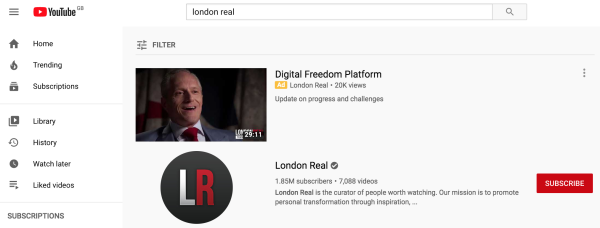
Youtube advertises link to Rose promoting London Real’s Digital Freedom Platform, 26 May
On Youtube, Press Gazette found adverts for Icke’s documentaries on video platform Gaia (see below) were being advertised on 22 May – weeks after his account had been deleted from the site amid concerns about his Covid-19 content.
Youtube is also still carrying advertising, and promoted posts, from London Real (see above), its events and the Digital Freedom Platform.
Youtube
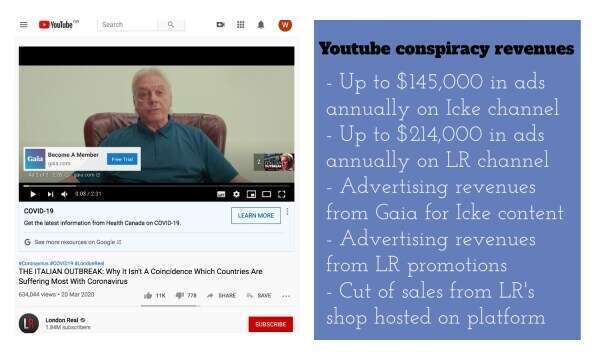
Made on BeFunky. Image shows Youtube advertising Icke’s videos on Gaia on 22 May
In a report prepared as part of its campaign to have Icke removed from Youtube, the CCDH estimated that his videos could be generating up to $322,000 in annual ad revenues, based on average views and publicly-available information on rates paid.
It estimated, based on available public information, that 55 per cent of this – $177,000 – would go to Icke, with Youtube retaining $145,000.
Transferring its methodology on to London Real, the CCDH estimates that the brand’s content could be worth up to $475,180 annually in ad revenues. Under the methodology, $213,831 would go to Youtube, and $261,349 would go to London Real.
Youtube may also derive income from London Real’s online store on the platform. A message on the shopping page stated last week, when viewed by Press Gazette, that Youtube “may receive compensation” from the links to London Real merchandise (see below).
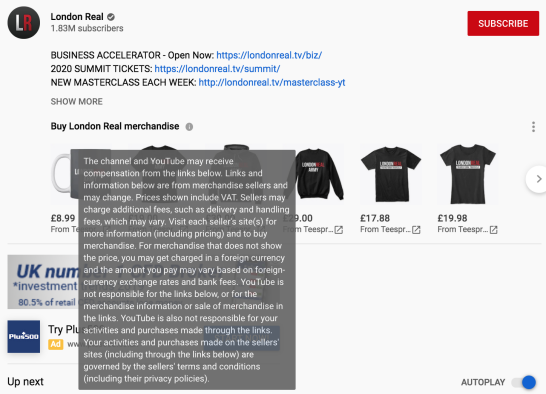
Message on London Real’s Youtube store, 20 May
As reported at the beginning of this article, despite Youtube’s apparent crackdown on Icke’s Covid-19 conspiracy theories, a ten-minute clip from London Real’s original interview with Icke on the subject remains on its website. Adverts were running alongside it before Press Gazette contacted Youtube about the clip.
In this part of the interview, Icke suggests Iran suffered badly from coronavirus because of its poor relations with the US and Israel.
Adverts for Amazon, a Game of Thrones video game, Plus 500 – an Israeli company listed on the London Stock Exchange – and other firms all appeared on the video when viewed by Press Gazette.
The brands that featured alongside this content are not endorsing it, and would not have been aware it was appearing there under Youtube’s advertising automation.
A source close to one of the companies that featured there, said: “Unfortunately there is not much that companies can do other than ignore it/ complain to the platforms, but I think most people appreciate it’s just one of life’s unfortunate twists.”
However, the situation remains that advertising alongside this content is in effect making money for Youtube and the video’s creator.
Youtube confirmed that London Real – as a channel that covers various topics rather than solely Icke and Covid-19 conspiracies – is currently able to monetise its content.
The Icke video flagged by Press Gazette – in which he suggests the US or Israel are to blame for Iran getting a bad case of coronavirus – was blocked from running ads due to violation of Youtube advertising policies around medical misinformation.
According to Youtube, it is dealing with the issue of misinformation by removing content that violates its guidelines, raising the profile of authoritative content and reducing recommendations on “borderline content”.
Since early February, the site has removed thousands of coronavirus-related videos that violate its rules, which includes, for example, content that denies the existence of Covid-19 and content that promotes dangerous remedies and cures.
Facebook and Instagram
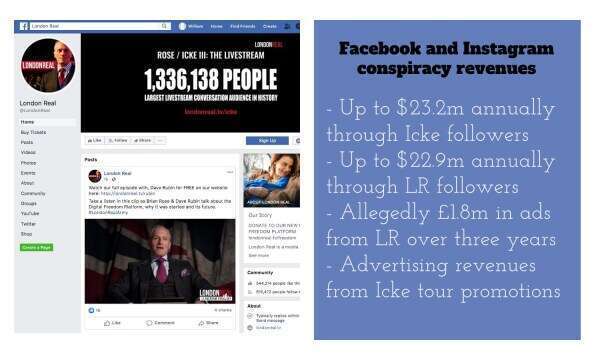
Made on BeFunky
The CCDH report estimated that Icke’s followers across Facebook and Instagram, which it owns, could have been worth up to $23.2m in annual revenue to the company.
This calculation is based on Facebook’s “Average Revenue Per Person” metric. This would make his pre-takedown 791,000 Facebook followers worth $20.2m and his 115,000 Instagram followers nearly $3m.
Using the same methodology, the Facebook account of London Real, as well as the Instagram accounts of London Real and Brian Rose, could be worth up to a combined $22.9m to the company.
In addition, Rose recently claimed in an Instagram post that London Real has been paying Facebook more than £50,000 a month in advertising over three years.
The CCDH also calculates that followers of Icke’s “verified” Twitter account could be worth up to $767,000 annually to Twitter. London Real’s followers, it estimates, could be worth up to $414,819 a year.
These estimates are based on the value of Icke and London Real’s audience, rather than their individual account values, which are difficult to calculate because of a lack of publicly-available information.
Facebook disputes this methodology, because many of those who liked or followed these pages will engage with other accounts. The firm did not provide different figures.
A Facebook spokesperson said: “We are continuously working to stop harmful misinformation spreading on our platforms and have removed hundreds of thousands of posts and [ages, including David Icke’s Facebook Page. We continue to remove ads and posts that try to exploit this emergency for financial gain, and since March we have taken down more than 2.5 million pieces of content of this nature. We are pointing people to the latest official NHS guidance directly from our platforms, to help keep people safe and informed.”
A spokesman for CCDH defended the calculation, saying: “We believe they are the best possible estimates, and they show one reason why social media companies are often reluctant to remove accounts- because the accounts’ audience is worth a lot to the platforms and they don’t want to drive them to other websites.”
Twitter says a “verified” account does not mean an endorsement. A spokesman said: “We’re prioritising the removal of Covid-19 content when it has a call to action that could potentially cause harm. As we’ve said previously, we will not take enforcement action on every tweet that contains incomplete or disputed information about Covid-19. Since introducing these policies on 18 March, and as we continue to double down on tech, our automated systems have challenged more than 3.4 million accounts which were targeting discussions around Covid-19 with spammy or manipulative behaviours.”
Email pged@pressgazette.co.uk to point out mistakes, provide story tips or send in a letter for publication on our "Letters Page" blog
